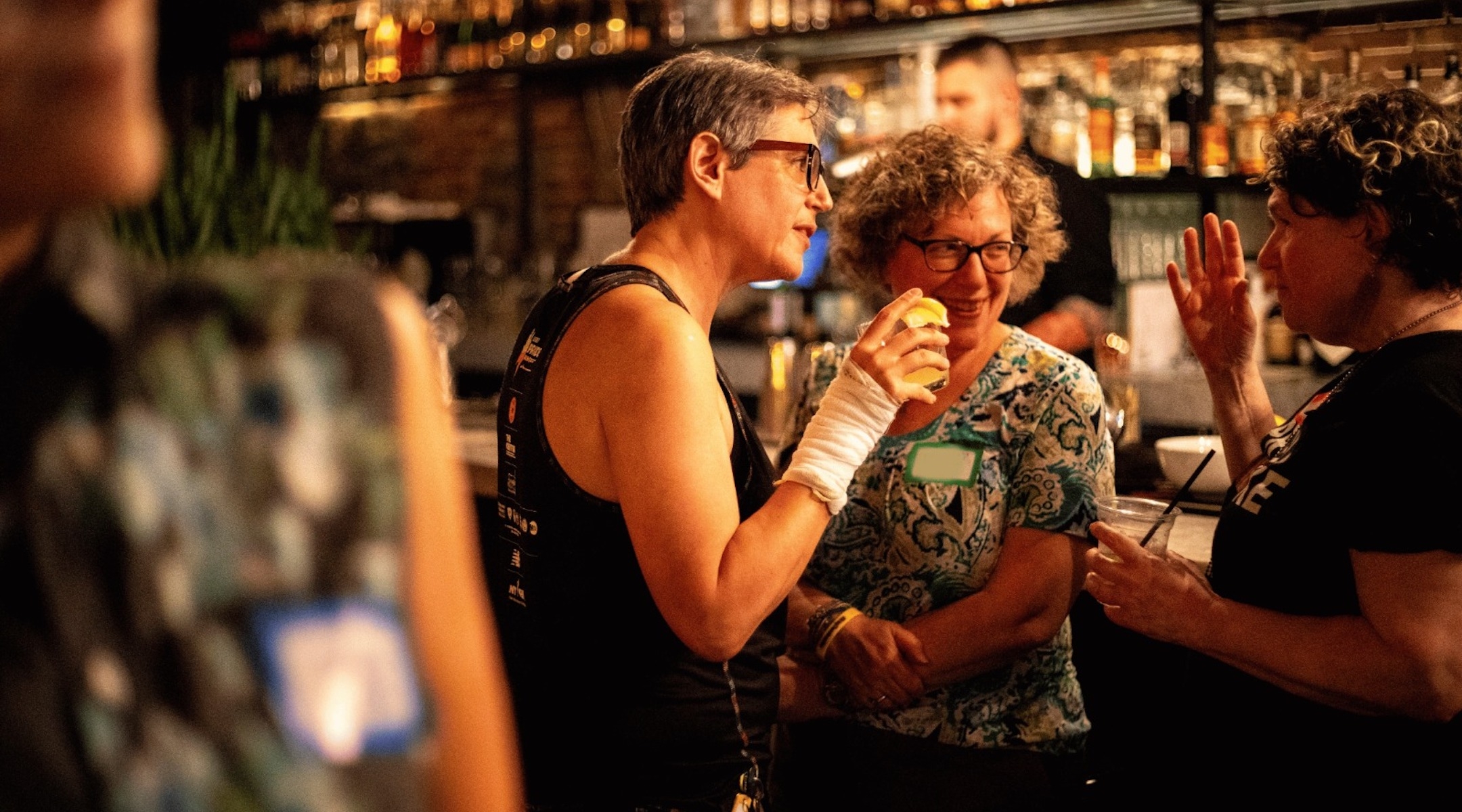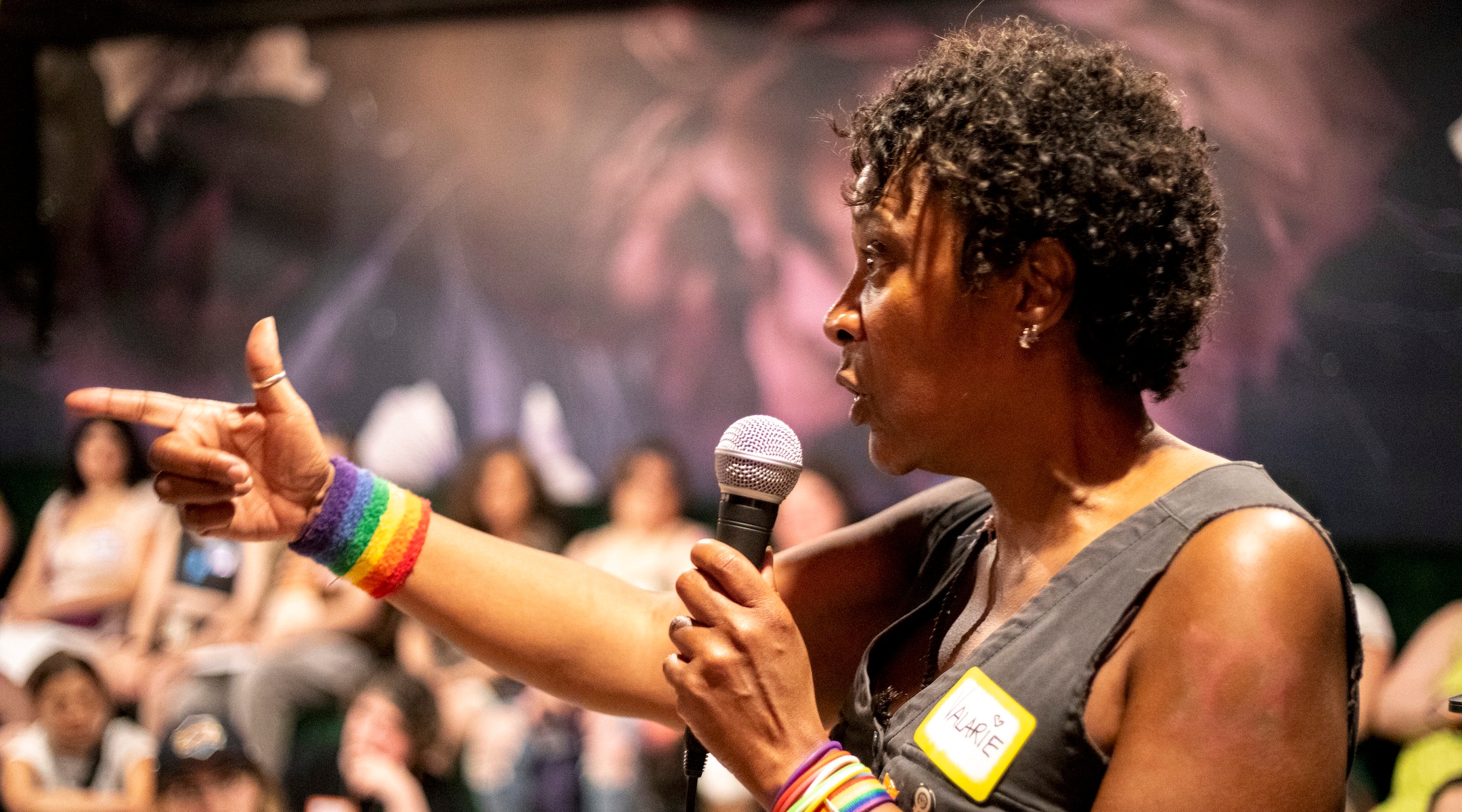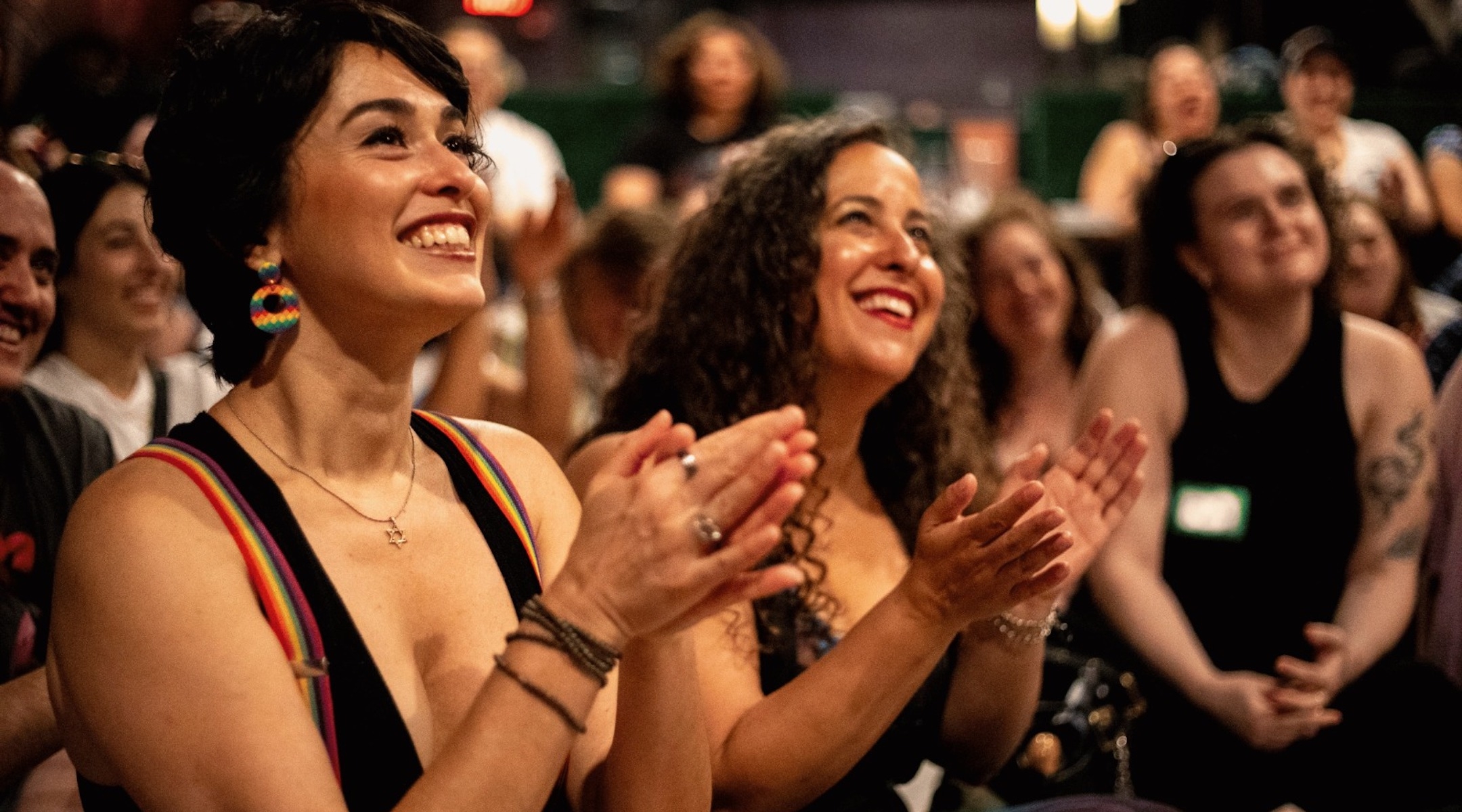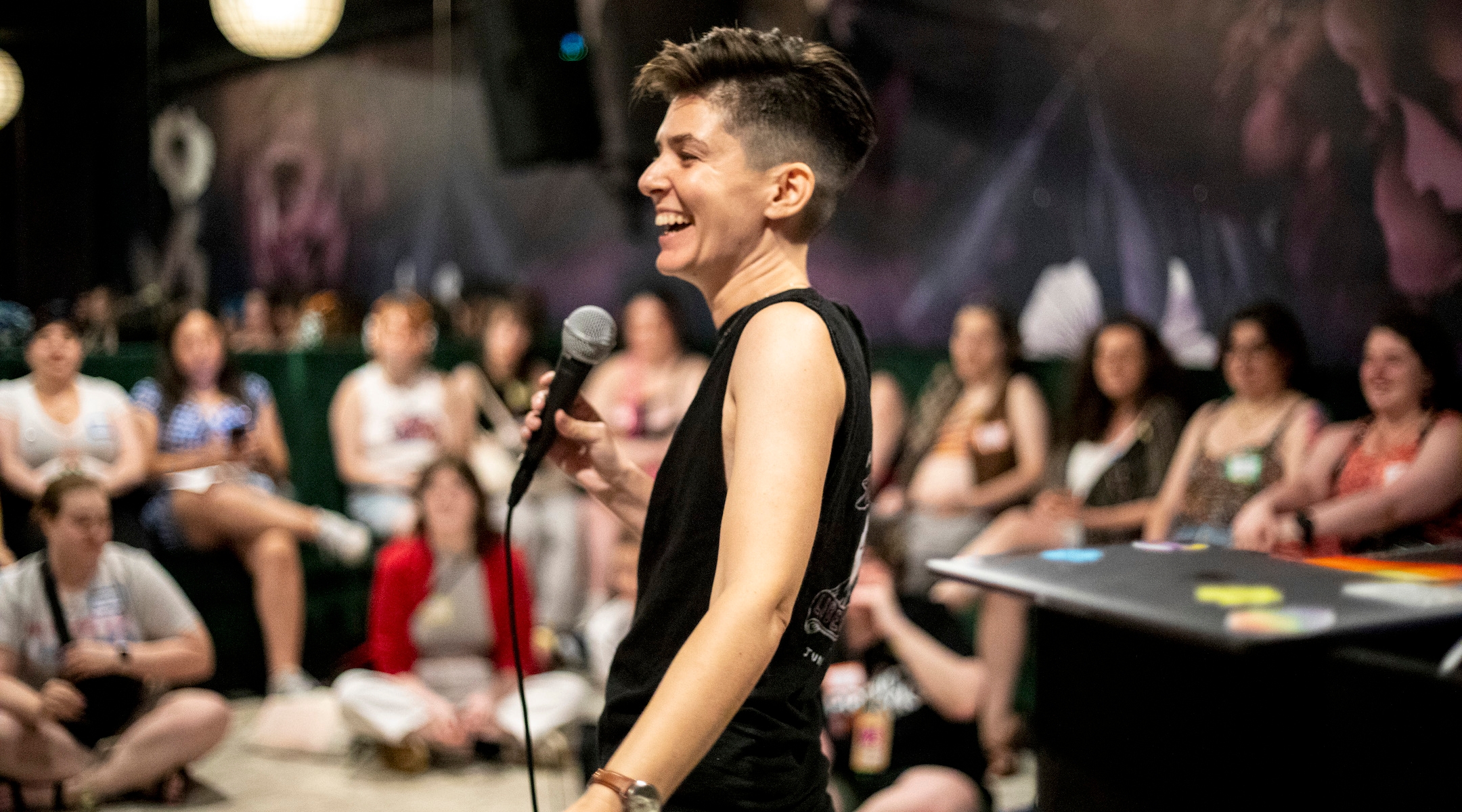On Saturday, as New Yorkers celebrated the last weekend of Pride Month, Nate Shalev was in an unusual position: organizing an impromptu party called “Shalom Dykes” for hundreds of people in an East Village bar.
The energy in the room was fun and upbeat, with craft stations, music and drinks. But for Shalev, who is trans and uses they/them pronouns, the joy of the event was tinged with betrayal. For the last decade, their favorite day of the year had been the New York City Dyke March, which was taking place later that day a couple miles uptown.
“It was a day where I could walk down the street feeling like myself. Whether I was joyful or rageful, I could just be who I am in my own body. There was no other day like that,” Shalev, who is Jewish and whose wife is Israeli, told the New York Jewish Week. “It was my vision for the future. It is how I wanted the world to be.”
Shalev had sat on the Dyke March’s organizing committee in the past. But this year, they didn’t attend the march at all.
For the past 30 years, Dyke Marches have been billed as a more explicitly lesbian-focused and politically progressive alternative to the Pride parades held each June in major cities across the globe, and in recent years they’ve been known for their outspoken opposition to Israel. The theme of this year’s New York City march — “Dykes Against Genocide,” which the group says Israel is committing in Gaza — followed suit.
That emphasis, and subsequent statements by the march’s leadership, made Shalev feel like they no longer belonged in one of the places they once felt most comfortable.
“I felt unwelcome, unsafe — like I didn’t really belong there. It became impossible and harmful to have a conversation,” Shalev said.
In recent days, the organizers of NYC Dyke March drew more attention to their handling of the issue. On June 27, they released a statement making clear that the march was committed to the safety of Jewish members, and condemned Hamas’ Oct. 7 attack. It said, “we stand against anti-semitism in all forms.”
“While we believe it is urgent to center the dire plight of the Palestinian people, we understand the need from our community to address Jewish pain and fear in the face of rising antisemitism worldwide,” the statement said. “We mourn the senseless loss of Jewish life that occurred as a result of the October 7th attacks.”
But within 30 minutes, organizers deleted that post and put out a second statement calling it “a mistake” that “was published without a full committee-wide vote and [that] does not reflect the official stance of the Dyke March.”
“We take full responsibility and apologize for the process and communication breakdown that led us here, as well as the harm our statement caused. Dyke March unapologetically stands in support of Palestinian liberation,” read the new statement, which is now the only one publicly available. “This moment is a critical reminder for our committee to remain firm in our stance that anti-Zionism is not antisemitism, and any language we put out which is not clearly opposed to a Zionist, imperialist agenda is harmful to all.”
The Dyke March was also raising money for donations to several groups in honor of their theme this year, including for Within Our Lifetime, a hardline Pro-Palestianian group in New York that posted support for Hamas on Oct. 7 and routinely rallies in New York, including at the Brooklyn Museum and Nova Music Festival exhibit.
Communication like that led Shalev and a few other volunteers to quickly organize Shalom Dykes, billed as an alternative for Jewish lesbians and queer people who felt ostracized and concerned about the Dyke March’s recent statements and this year’s theme.
While the idea for the party stemmed from feelings of exclusion, it was still Pride weekend: Attendees visited craft stations where they made name tags with stickers and colorful markers. Cards with conversation starters were strewn about the bar, so revelers could ask each other things like “What’s a queer or Jewish tradition you’ve created or would like to create?”
Some guests handed out fliers for “Jewish Sapphic Speed Dating” events while others got drinks at the bar and danced to music.

Guests mingled, danced and partied at the bar at Shalom, Dykes. (Melody Melamed)
Although it was organized as a response to anti-Israel activism, Shalom Dykes didn’t feature Israeli flags and symbols, and did not have the feel of a pro-Israel event. Some partygoers discussed their feelings about Israel and their disappointment in not attending the Dyke March, but most were focused on having fun and meeting new people. As one 23-year-old woman who asked to remain anonymous said, “I’ve never seen so many Jewish lesbians in one place.”
Matzah Belle Soup, a drag performer, danced and sang to “Don’t Rain On My Parade” from “Funny Girl” as well as songs by Chappell Roan and Cher.
“For folks who’ve just been confused or horrified by what the Dyke March has been putting out, it’s nice to give that space to be positive and forward facing and build something based on inclusion, not exclusion,” Shalev said.
Shalev wasn’t the only Dyke March veteran in the room. Some women had been to more than 30 marches.
“I’m really glad that the event is happening. I’m sad that it’s happening. I’m sad that everybody can’t be together at the Dyke March, being who they are. But I’m glad that people have figured out a way to be together and celebrate who they are in its entirety,” said Maxine Wolfe, who helped organize the first-ever Dyke March in 1993.

Valarie Walker attended and helped organize the first Dyke March in 1993. (Melody Melamed)
Valarie Walker also attended the first-ever Dyke March in Washington D.C. in 1993 and has been a member of the organizing committee, as well as of the group the Lesbian Avengers ever since.
While not Jewish, she said she was drawn towards Judaism and became friends with the Jewish community as a student at Vassar College because of the solidarity the Jewish community showed her as one of the few Black students at the school. She decided to attend Shalom Dykes out of solidarity.
“When I realized the language that was being used this year was so exclusionary, I couldn’t go,” she said. “It wasn’t about me feeling safe, it was that my people aren’t going to be there and my people didn’t feel safe. That isn’t what the Dyke March is supposed to be.”
She added, “Even as it twisted my gut to have a separate event, I understand the need for it.”

Around 250 guests attended “Shalom, Dykes” instead of the NYC Dyke March. (Melody Melamed)
Shalev decided to leave the organizing committee of the official Dyke March in December, when other committee members began to discuss this year’s theme and, Shalev felt, shut down the perspectives of Jewish and Israeli committee members.
“I’ve been on this committee for 10 years and I’ve been building relationships with folks over that amount of time. We’ve had difficult conversations but we were able to communicate. We rely on one another to keep each other safe and we have been able to trust each other throughout that process,” they said. “But when this conversation came about, all of a sudden, it felt like my humanity wasn’t being seen anymore. It was this exclusionary conversation that wasn’t community-based.”
NYC Dyke March did not respond to a request for comment.
Dyke Marches in years past have taken stances against Israel, and have also drawn accusations of antisemitism. In 2017, the Chicago Dyke March asked three women who were carrying rainbow flags with the Star of David on them to leave the march, claiming that the flags too closely resembled the Israeli flag and that the march was anti-Zionist.
In 2019, organizers of the D.C. Dyke March banned Israeli and American flags, the Jewish pride flag with the star in its center and “nationalist symbols” at the march, although they allowed Palestinian flags. Eventually, women carrying Jewish pride flags were let in.
Despite their disappointment in this year’s march, both Shalev and Walker insist that they want to be back on the organizing committee next year.
“We’re not giving up on the Dyke March in the future,” Shalev said. “I want the Dyke March to live up to those values of inclusion.
Shalev also hopes to organize future events for Jewish and queer people in the future. At the party, they collected testimonies from attendees about their experiences being Jewish and queer.
“It feels really nice to be able to create a community where folks can feel like they can bring their Jewish and queer identities and be able to uphold the values of the Dyke March, which were all about self determination and inclusion and providing the safer space for dykes to be visible in a way that we don’t have every other day of the year,” Shalev said. “So this has been really healing in a lot of ways.”
The New York Jewish Week brings you the stories behind the headlines, keeping you connected to Jewish life in New York. Help sustain the reporting you trust by donating today.





